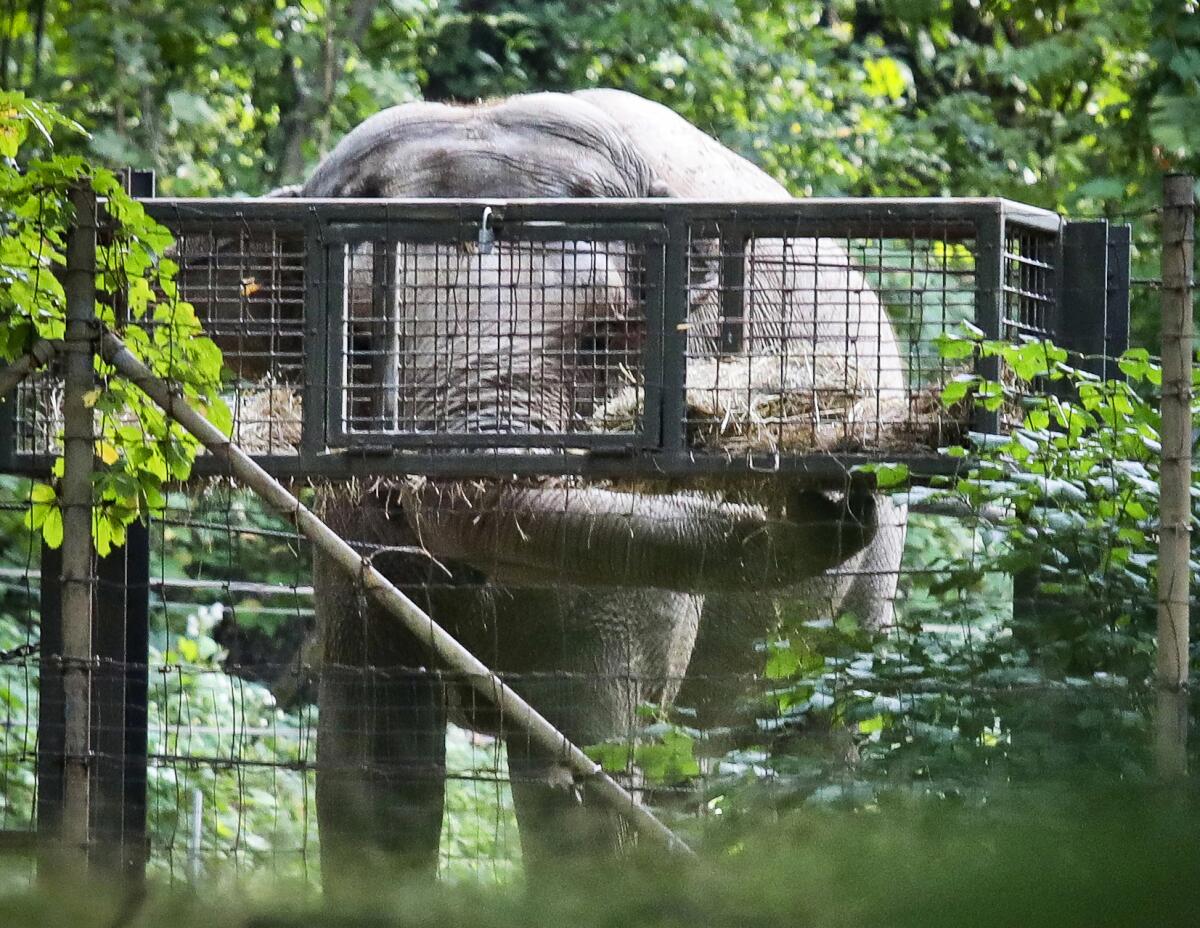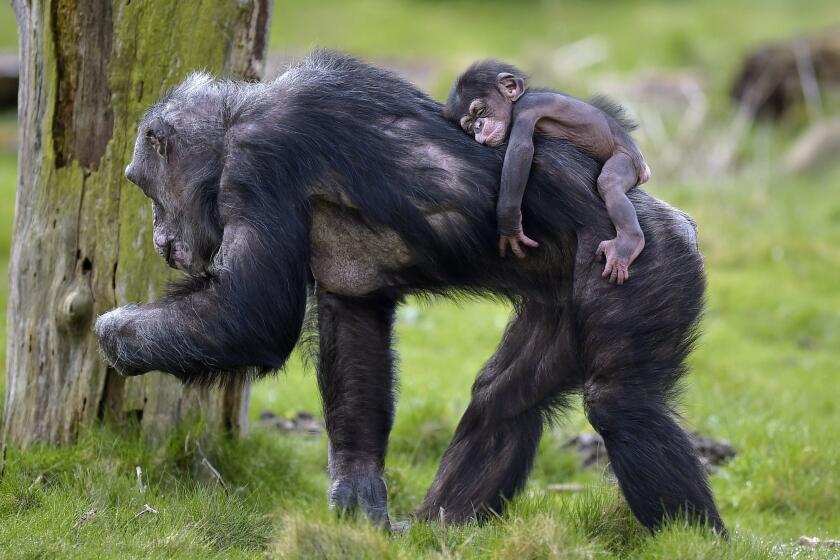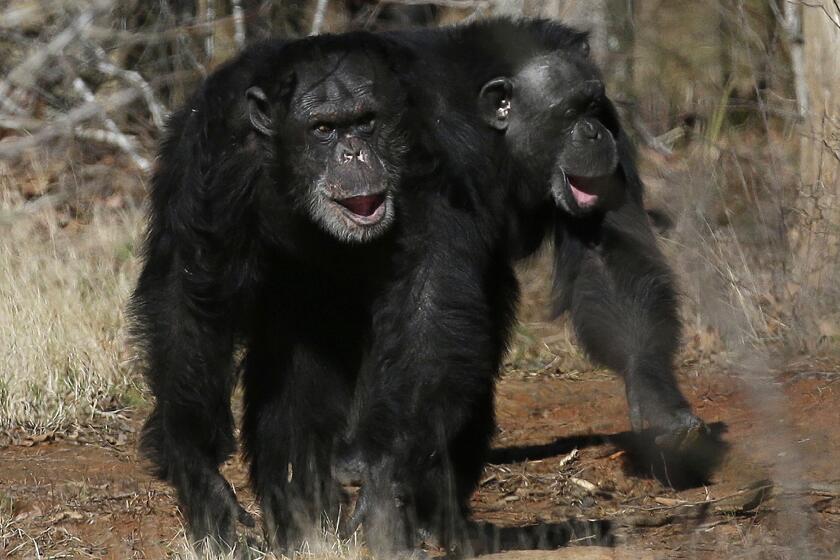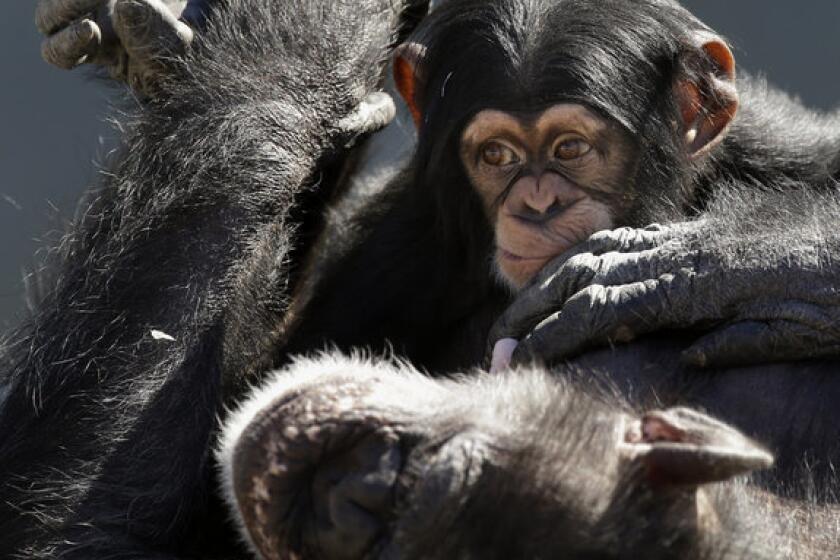Are animals entitled to basic legal rights just like people?

- Share via
Happy is an Asian elephant who has lived since 1977 in captivity at the Bronx Zoo.
In 2018, lawyers for a group known as the Nonhuman Rights Project went to court seeking her release to an elephant sanctuary. They argued that “autonomous and extraordinarily cognitively complex” animals such as elephants and chimpanzees should not be dismissed as dumb beasts that humans may capture, imprison and display at will. Instead they should be treated as “legal persons” entitled to certain fundamental legal rights — including the right to “bodily liberty.”
It was a bold argument, but it didn’t fly. In mid-June, New York’s highest court rejected it, declaring that, no, elephants are not in fact people, and while they deserve to be treated with “proper care and compassion,” they don’t have legal rights like humans.
Opinion Columnist
Nicholas Goldberg
Nicholas Goldberg served 11 years as editor of the editorial page and is a former editor of the Op-Ed page and Sunday Opinion section.
But the Nonhuman Rights Project is not giving up. Less than a month later, it has moved on to the next battleground — in California, where it recently asked a Superior Court judge to order the Fresno Chaffee Zoo to explain why it is “illegally imprisoning” three elephants.
Maybe California will prove more sympathetic to the group’s arguments, which raise profound moral and ethical questions about humans’ interaction with the natural world.
The California petition was filed on behalf of Nolwazi and Amahle — two African elephants born in a 54,000-acre national park in Swaziland and taken from their natural habitat to zoos in the U.S. — and Vusmusi, an African elephant born at the San Diego Zoo Safari Park. All three are currently in captivity in Fresno.
When a court hearing was ordered to determine whether two chimpanzees, named Hercules and Leo, are being “unlawfully detained” by the State University of New York at Stony Brook, the primates (and their lawyers) made a bit of history.
The radical notion the lawyers are again putting forward is that the three elephants are entitled to habeas corpus rights, which have historically been granted only to humans. Habeas corpus, with roots that go back nearly 1,000 years in common law, is a legal principle that allows a prisoner to be brought before a court to determine whether he or she is being detained lawfully and to seek release.
If the petition is granted, the zoo would be ordered to explain and justify the elephants’ detention. Then the court would decide whether they should be released and sent to a sanctuary.
Jake Davis and Monica Miller, staff attorneys for the Nonhuman Rights Project, sounded upbeat, saying that with each new case, they were gaining a little more ground, and that they believed their argument is entering the mainstream.
I know that I’m beginning to be more sympathetic to what originally seemed to me like an outlandish position.
Undergirding the case are a number of arguments: that captivity is deeply damaging to the elephants, that the organization has the right to petition on the elephants’ behalf and that the right to habeas corpus must evolve and expand to keep pace with “science, justice, reason, ethics, fairness … and progress of society.”
The petition notes that the Fresno Chaffee Zoo was recently named one of the “10 worst zoos for elephants in the U.S.” by the group In Defense of Animals.
Plans for a $650-million makeover of the Los Angeles Zoo have angered environmentalists, who say it would destroy native woodlands.
Of course no one is arguing that elephants are actually humans — merely that they are “similarly situated” to people for the purposes of habeas corpus. They’re entitled to “personhood” only in the legal sense, much as corporations and ships can be persons in the eyes of the law.
In what sense are elephants similarly situated to humans? They have long-term memories, learning abilities, empathy and self-awareness.
“They live in families; they protect their young; they grieve their dead; they don’t eat other animals, and they don’t cage, isolate and torture them,” wrote Harvard historian Jill Lepore in the Atlantic. “They seem to understand themselves as individuals, with thoughts that differ from the thoughts of other creatures. They suffer, and they understand suffering.”
The New York and Fresno cases are part of an ongoing, yearslong campaign to provide legal rights to nonhuman animals. An earlier case involving chimpanzees’ habeas corpus rights also reached New York’s top court, where it was unsuccessful but received strong words of support from one judge.
The National Institutes of Health should keep its promise and send 44 chimps used in biomedical research to live out their lives in a sanctuary.
“Does an intelligent nonhuman animal who thinks and plans and appreciates life as human beings do have the right to the protection of the law against arbitrary cruelties and enforced detentions visited on him or her?” wrote Judge Eugene Fahey in 2018. “This is not merely a definitional question, but a deep dilemma of ethics and policy that demands our attention.”
Then came Happy’s case. This time there were two sympathetic judges — an enormous step forward. In his dissent, Judge Rowan D. Wilson noted that “the rights we confer on others define who we are as a society.”
I don’t mean to suggest this is a simple issue. There are plenty of counterarguments.
The Bronx Zoo noted for instance that Happy was being held in compliance with all laws and accepted standards of care.
The New York Court of Appeals noted that habeas corpus was intended to protect people and had never been applied to a nonhuman animal.
Expanding the definition would lead, the court said, to “a labyrinth of questions.” It would call into question the very premises underlying not just agricultural animal ownership and laboratory testing of animals but also pet ownership.
Rewriting rules on chimps
Rewriting rules on chimps
“What of dolphins — or dogs? What about cows or pigs or chickens — species routinely confined in conditions far more restrictive than the elephant enclosure at the Bronx Zoo?” asked Chief Judge Janet DiFiore in the majority opinion.
And I can’t help wondering what it is that makes chimps and elephants entitled to legal protections that are not available to goldfish? Is it “cognitive complexity” that should make the difference? Or consciousness? The ability to suffer?
And if all animals have the right to sue, well, as one Pepperdine professor put it: “Legal persons can’t be eaten.”
I don’t claim to know the answers. But human “exceptionalism” is simply not a persuasive argument. Why do we believe that just because we can dominate the world around us and mistreat our fellow animals, we should?
For too long, we’ve salved our consciences with tepid animal welfare laws that allow us to feel magnanimous and benevolent — rather than acknowledging our moral obligations and recognizing that the other living creatures with whom we share the planet have rights too.
More to Read
A cure for the common opinion
Get thought-provoking perspectives with our weekly newsletter.
You may occasionally receive promotional content from the Los Angeles Times.















